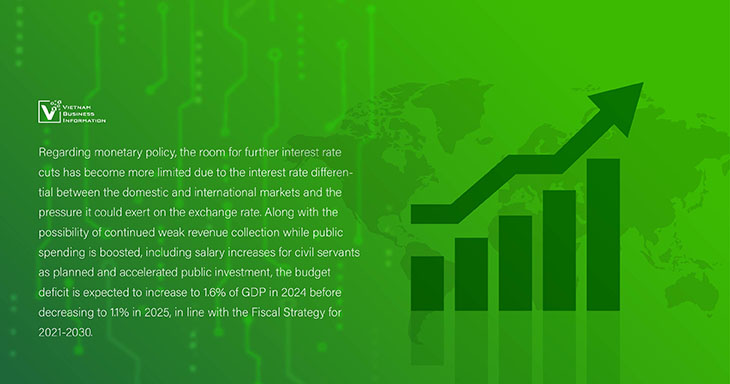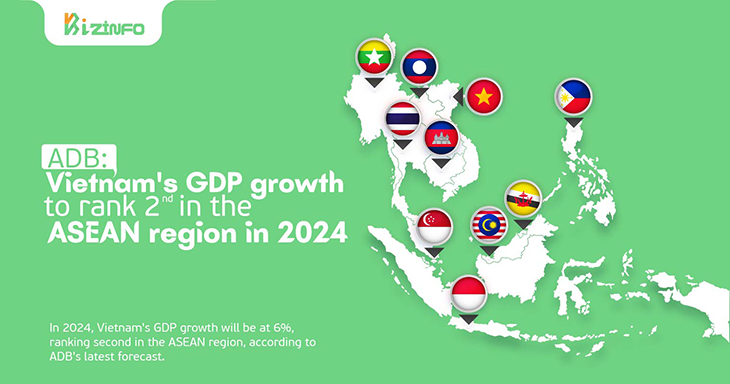Published Apr 2024
WB expert: Poor quality of financial assets affects growth prospects
According to World Bank experts, the quality of assets in the financial sector continues to deteriorate due to the declining real estate market, which could negatively impact growth prospects as reserve capital remains relatively thin, especially for some large state-owned commercial banks.

Analyzing the growth drivers of Vietnam at the event announcing the Report Update on the Economic Situation of Vietnam on the morning of April 23, the World Bank (WB) stated that in the first quarter, Vietnam's GDP growth reached 5.66% compared to the same period last year, mainly due to a strong recovery in goods exports, which increased by 17.2% thanks to increased exports to the US and Europe.
While consumer spending (up 4.9%) and investment (up 4.7%) are still lower than the growth rates seen in the pre-pandemic period (corresponding to 7.1% and 6.2% compared to the same period last year).
Opportunities and risks
Regarding prospects, the WB maintains its forecast for Vietnam's GDP growth at 5.5% in 2024 and expects it to increase to 6.0% in 2025.
Meanwhile, inflation is forecasted to slightly increase from an average of 3.2% in 2023 to 3.5% this year, mainly due to the expected increase in prices of state-managed items such as education and healthcare, contributing 6.2% and 5.4% respectively to the CPI basket's weight.
Subsequently, CPI inflation is expected to decrease to 3.0% in 2025 and 2026 due to expectations of stability in energy and commodity prices.
Dorsati Madani, a senior WB economist, said this forecast is based on the assumption that exports of manufactured goods will continue to recover in 2024 as global demand gradually improves; the real estate market is expected to turn around by the end of 2024 and in 2025 as signs of thawing in the bond market emerge.

"In conditions where exports and the real estate market gradually recover, domestic demand will tend to increase as investors and consumers regain confidence, with total private investment and consumption (at comparable prices) expected to increase by 5.5% and 5.0% respectively," Madani assessed.
Along with the opportunities, this expert also pointed out the risks and challenges to Vietnam's economy. Specifically, externally, lower-than-expected growth in developed economies and China may reduce foreign demand for Vietnam's exports. Moreover, increasing geopolitical tensions and climate-related disasters will increase risks for Vietnam.
Madani emphasized that domestically, the slower-than-expected recovery of the real estate market could affect investor sentiment and private sector investment. The poor quality of assets in the financial sector continues to deteriorate due to the declining real estate market, which could negatively impact growth prospects, especially for some large state-owned commercial banks, as reserve capital remains relatively thin.
Short and long-term solutions
Looking positively, Sebastian Eckardt, WB Director for Macroeconomics, Trade, and Investment in East Asia and the Pacific, believes that higher-than-expected global growth will help Vietnam's exports recover more strongly than expected.
Therefore, in the future, policy support should continue to be provided to promote economic recovery, such as accelerating the disbursement of public investment to support aggregate demand in the short term, while helping narrow the infrastructure gap currently emerging.
"Investing in public infrastructure projects creates many long-term benefits alongside immediate economic stimulation. Efforts to enhance public investment management will also address important infrastructure bottlenecks in energy, transportation, and logistics, which are the foundation for Vietnam's long-term economic growth," Eckardt recommended.
Regarding monetary policy, the room for further interest rate cuts has become more limited due to the interest rate differential between the domestic and international markets and the pressure it could exert on the exchange rate. Along with the possibility of continued weak revenue collection while public spending is boosted, including salary increases for civil servants as planned and accelerated public investment, the budget deficit is expected to increase to 1.6% of GDP in 2024 before decreasing to 1.1% in 2025, in line with the Fiscal Strategy for 2021-2030.

Therefore, ensuring the stability of the financial sector remains paramount, with a focus on managing potential risks related to increasing bad debts, including those caused by declining property values in the real estate market.
"The capital buffer of commercial banks is currently relatively thin, and the decline in the real estate market could further reduce the capital of these banks," noted Sebastian Eckardt.
In the long run, Sebastian Eckardt also believes that in addition to providing short-term economic support packages, structural reforms need to be implemented to strengthen state management in vital services (information technology and communication, electricity, transportation) to green the economy, develop human resources, and improve the business environment, including through support for innovative startups.
Source: WB, vietnambiz
Compiled by VBI















